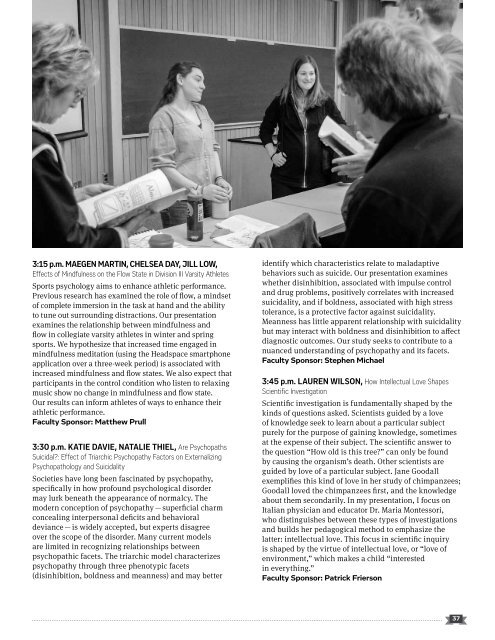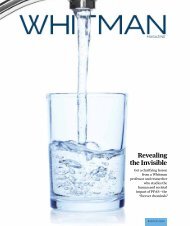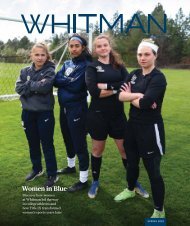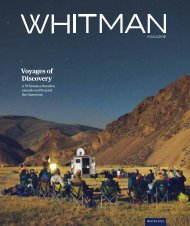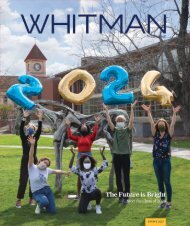You also want an ePaper? Increase the reach of your titles
YUMPU automatically turns print PDFs into web optimized ePapers that Google loves.
3:15 p.m. MAEGEN MARTIN, CHELSEA DAY, JILL LOW,<br />
Effects of Mindfulness on the Flow State in Division III Varsity Athletes<br />
Sports psychology aims to enhance athletic performance.<br />
Previous research has examined the role of flow, a mindset<br />
of complete immersion in the task at hand and the ability<br />
to tune out surrounding distractions. Our presentation<br />
examines the relationship between mindfulness and<br />
flow in collegiate varsity athletes in winter and spring<br />
sports. We hypothesize that increased time engaged in<br />
mindfulness meditation (using the Headspace smartphone<br />
application over a three-week period) is associated with<br />
increased mindfulness and flow states. We also expect that<br />
participants in the control condition who listen to relaxing<br />
music show no change in mindfulness and flow state.<br />
Our results can inform athletes of ways to enhance their<br />
athletic performance.<br />
Faculty Sponsor: Matthew Prull<br />
3:30 p.m. KATIE DAVIE, NATALIE THIEL, Are Psychopaths<br />
Suicidal?: Effect of Triarchic Psychopathy Factors on Externalizing<br />
Psychopathology and Suicidality<br />
Societies have long been fascinated by psychopathy,<br />
specifically in how profound psychological disorder<br />
may lurk beneath the appearance of normalcy. The<br />
modern conception of psychopathy — superficial charm<br />
concealing interpersonal deficits and behavioral<br />
deviance — is widely accepted, but experts disagree<br />
over the scope of the disorder. Many current models<br />
are limited in recognizing relationships between<br />
psychopathic facets. The triarchic model characterizes<br />
psychopathy through three phenotypic facets<br />
(disinhibition, boldness and meanness) and may better<br />
identify which characteristics relate to maladaptive<br />
behaviors such as suicide. Our presentation examines<br />
whether disinhibition, associated with impulse control<br />
and drug problems, positively correlates with increased<br />
suicidality, and if boldness, associated with high stress<br />
tolerance, is a protective factor against suicidality.<br />
Meanness has little apparent relationship with suicidality<br />
but may interact with boldness and disinhibition to affect<br />
diagnostic outcomes. Our study seeks to contribute to a<br />
nuanced understanding of psychopathy and its facets.<br />
Faculty Sponsor: Stephen Michael<br />
3:45 p.m. LAUREN WILSON, How Intellectual Love Shapes<br />
Scientific Investigation<br />
Scientific investigation is fundamentally shaped by the<br />
kinds of questions asked. Scientists guided by a love<br />
of knowledge seek to learn about a particular subject<br />
purely for the purpose of gaining knowledge, sometimes<br />
at the expense of their subject. The scientific answer to<br />
the question “How old is this tree?” can only be found<br />
by causing the organism’s death. Other scientists are<br />
guided by love of a particular subject. Jane Goodall<br />
exemplifies this kind of love in her study of chimpanzees;<br />
Goodall loved the chimpanzees first, and the knowledge<br />
about them secondarily. In my presentation, I focus on<br />
Italian physician and educator Dr. Maria Montessori,<br />
who distinguishes between these types of investigations<br />
and builds her pedagogical method to emphasize the<br />
latter: intellectual love. This focus in scientific inquiry<br />
is shaped by the virtue of intellectual love, or “love of<br />
environment,” which makes a child “interested<br />
in everything.”<br />
Faculty Sponsor: Patrick Frierson<br />
37


